Speaker biographies
To look up a speaker biography, click on their name below (listed in alphabetical order by surname):
- Beatriz Baño-Otálora
- Dan Brierley
- Lukasz Chrobok
- Laura Dearden
- Elodie Desroziers
- Helen Eachus
- Teodora Georgescu
- Simon Guillot
- Naresh Hanchate
- Allan Herbison
- Jenni Harvey
- Deyana Ivanova
- Sharon Ladyman
- Anna Murray
- Valerie Simonneaux
- Manuel Tena-Sempere
- Eder Zavala
Beatriz Baño-Otálora

Talk: Brighten up your circadian clock: Impact of daytime light intensity on behaviour and brain clock function in a diurnal mammal.
When: 9am, Tuesday 5 September 2023, Symposium: Rhythms of life (view programme)
Dr Beatriz Bano-Otalora studied Biology at the University of Murcia (Spain) where she then completed her PhD in Circadian Physiology. Following a postdoc with Prof Hugh Piggins, she joined Prof Rob Lucas’ Lab in 2017 at the University of Manchester to work on understanding the impact of daytime light exposure and self-selected lighting conditions on circadian rhythms and clock function in a diurnal rodent. In October 2022, she got a Lectureship at the University of Manchester where she is establishing her independent group focussed on understanding the neuronal mechanisms of circadian timekeeping in the diurnal brain.
Dan Brierley

Talk: Mapping GLP-1 signalling pathways in the gut-brain axis reveals novel strategies for obesity pharmacotherapy
When: 4pm, Monday 4 September 2023, Symposium: Metabolism - Beyond the hypothalamus (view programme)
Dan conducted his PhD at the University of Reading under Claire Williams’ supervision, studying the potential of phytocannabinoids to treat chemotherapy-induced anorexia and cachexia. He undertook his postdoctoral research in Stefan Trapp’s lab at UCL, investigating how GLP-1 signalling in the brainstem modulates eating behaviours. He recently started his own laboratory at UCL, funded by a Wellcome Trust Sir Henry Dale Fellowship to study obesity-induced dysfunction in gut-brain satiation circuitry.
Lukasz Chrobok
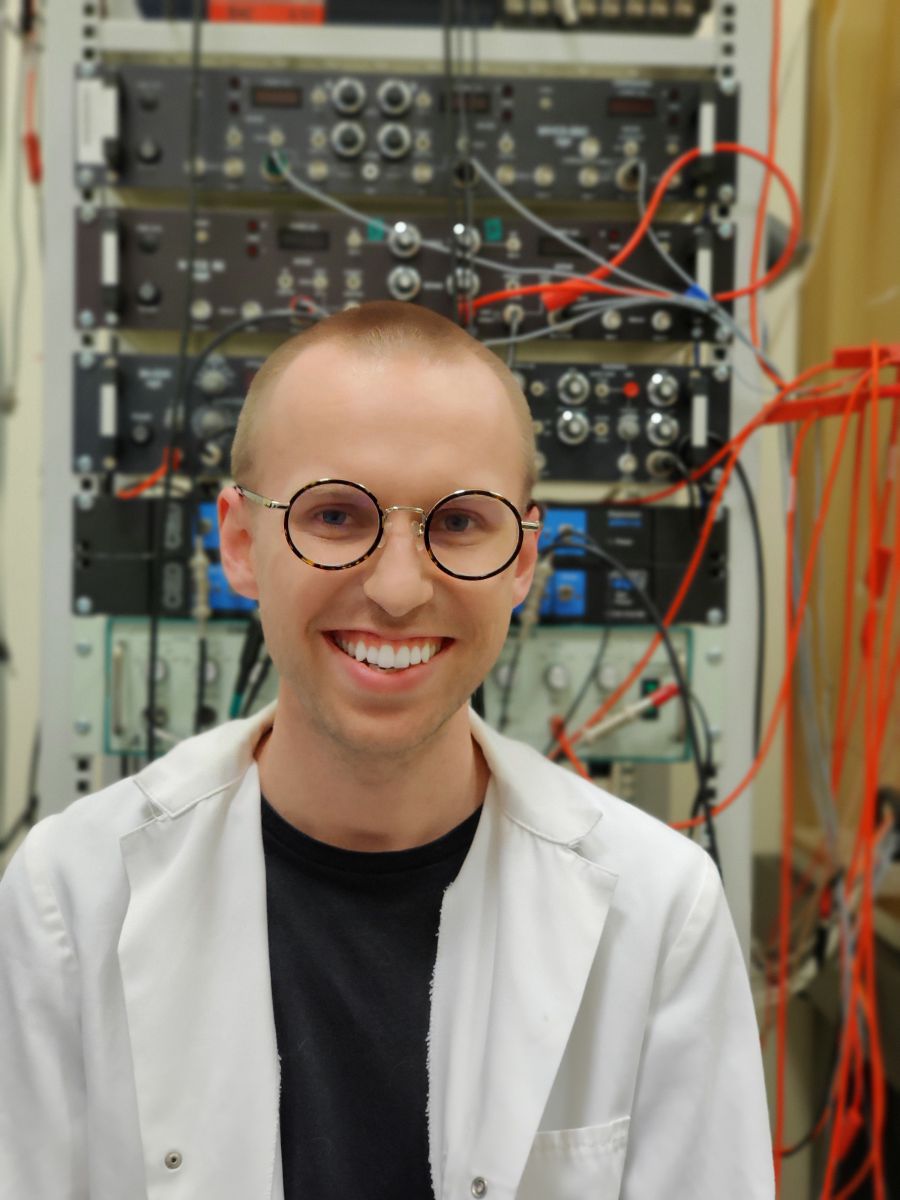
Talk: Circadian timekeeping in the brainstem satiety centre
When: 9am, Tuesday 5 September 2023, Symposium: Rhythms of life (view programme)
Lukasz Chrobok obtained his PhD from Jagiellonian University (JU) in Krakow, Poland, in 2017, followed by a DSc in 2022. He held a post-doctoral position at the University of Manchester, UK, and a Research Fellowship at JU and the University of Exeter, UK. Currently, he is a Sir Henry Wellcome Postdoctoral Fellow at the University of Bristol, UK. Dr. Chrobok's scientific interests centre on various aspects of circadian and metabolic neurophysiology, with a recent focus on brainstem timekeeping. For the past five years, he has dedicated his investigations to exploring the mechanisms and role of the circadian timekeeping of the dorsal vagal complex and its susceptibility to high-fat diets.
Laura Dearden

Talk: Early life programming of obesity via a hypothalamic miRNA involved in fatty acid sensing
When: 2pm, Tuesday 5 September 2023, Symposium: Neuroendocrine adaptations during pregnancy & development (view programme)
Laura Dearden is a Royal Society Dorothy Hodgkin Research Fellow at the Institute of Metabolic Science, University of Cambridge. Prior to her current appointment she was a Sir Henry Wellcome Fellow in the laboratory of Professor Susan Ozanne. Laura undertook her PhD with Dr Nina Balthasar at the University of Bristol, researching how the hypothalamus integrates and responds to nutrient signals from the periphery. During her PhD, Laura became interested in how these processes might be programmed pathologically by exposure to sub-optimal nutrition in pregnancy- a time when the fetal hypothalamic development is vulnerable to disruption. Laura’s research group is combining molecular and physiological methods to identify the influences of the in utero metabolic environment, with a focus on insulin, on the development and subsequent function of hypothalamic feeding circuits.
Elodie Desroziers
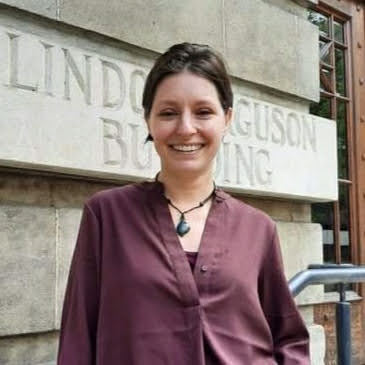
Talk: Unusual suspect: role of microglia in the neuroendocrine disorder polycystic ovary syndrome
When: 9am, Wednesday, 6 September 2023, Symposium: Reproductive Neuroendocrinology (view programme)
Dr Elodie DESROZIERS is an assistant professor at Sorbonne University since September 2021. She is a principal investigator in the team “Neuroplasticity of reproductive behaviors” led by Dr Sakina Mhaouty-Kodja at the Institut de Biologie Paris Seine, Paris, France. Her research interests always focused on the effect of sex steroids on the brain in order to regulate fertility and sexual behaviours. She obtained her PhD in Life Science and Health in December 2011 from the University Francois Rabelais of Tours, France where she studied the ontogenesis of Kisspeptin neurons, important neuronal regulators of reproductive function. Then, during her first post-doctoral position in Dr Julie Bakker laboratory (2012-2015, University of Liege, Belgium), she showed a role for prepubertal progesterone signaling in the feminization of the brain. In 2015, she joined the Center for Neuroendocrinology ( CNE) at the University of Otago New Zealand. First for a postdoctoral position in the A/P Rebecca Campbell laboratory (2015-2020) and then as Principal Investigator (2021-2022). Within the CNE, her research focused on the role of the brain in the most common infertility disorder in women of reproductive age worldwide: Polycystic Ovary Syndrome (PCOS). She showed a role for arcuate GABAergic neurons in the establishment of PCOS-like features (2015-2018). Then, she studied the role of prenatal androgen excess in sexual dysfunction in a preclinical mouse model of PCOS (2018-2021). In 2020, she was awarded an early career development grant, the Hercus Fellowship, from the Health Research Council of New Zealand. This funding was dedicated to the study of the role of microglia in fertility regulation and PCOS which will be the topic of her talk at this BSN annual meeting. Finally, in her new permanent position at Sorbonne University, she is pursuing her investigation on the role and effect of sex steroids signaling on glial cells within the brain associated with reproductive function and behaviors.
Helen Eachus
Talk: Elevated glucocorticoid: from adaptive plasticity to allostatic overload
When: 2pm, Tuesday 5 September 2023, Symposium: Neuroendocrine adaptations during pregnancy & development (view programme)
Helen Eachus is a post-doctoral fellow at the Living Systems Institute, University of Exeter.
Since Helen's Bachelors degree, she has been interested in how exposure to stress shapes the brain and behaviour across the life course. Helen carried out my PhD at the University of Sheffield, studying gene X environment interactions using a zebrafish model. Helen's work investigated how a genetic risk factor for schizophrenia, DISC1, modulates development and function of the hypothalamus, the critical regulator of the vertebrate stress response. Following this, she began my post-doctoral study at Sheffield, working on two different projects. The first project focused on epigenetic embedding of stress in the zebrafish brain, whilst the second project involved characterisation of a zebrafish disease model of impaired stress hormone biosynthesis known as congenital adrenal hyperplasia. Now based at the University of Exeter as a post-doctoral fellow, Helen has continued to develop her interest in stress regulation of brain plasticity. Her current work is focused on how exposure to elevated glucocorticoid during early life alters the trajectory of hypothalamic development and function, using a zebrafish model.
Teodora Georgescu - Michael Harbuz Prize awardee 2023

Talk: Suppression of fever, but not sickness behaviours in late pregnancy in mice
When: 11am, Wednesday 6 September, Julia Buckingham Award and Michael Harbuz Prize Lectures, Xfi Henderson Lecture Theatre (view programme)
Simon Guillot - Julia Buckingham Award winner 2023
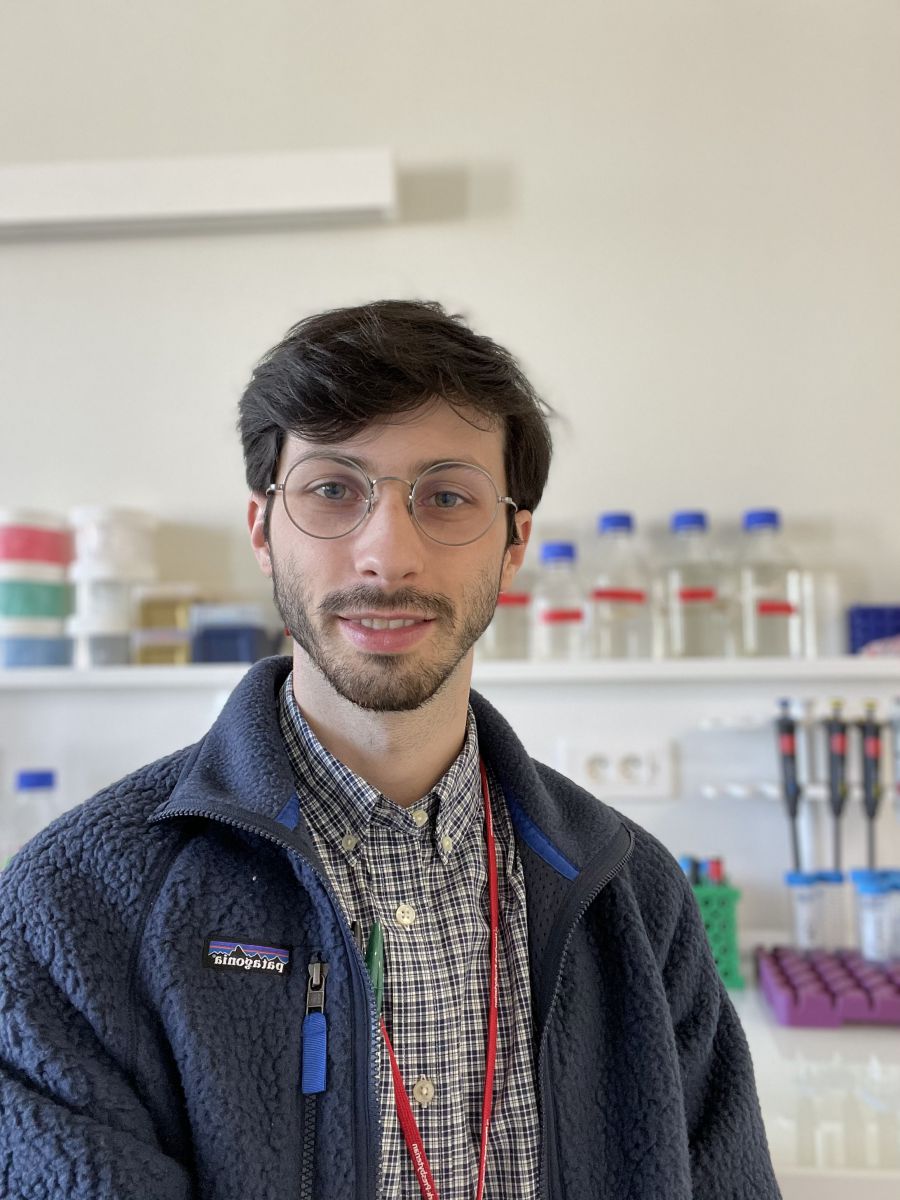
Talk: Hypothalamus-driven sleep alterations in a neurodegenerative disease: Amyotrophic Lateral Sclerosis
When: 11am, Wednesday 6 September, Julia Buckingham Award and Michael Harbuz Prize Lectures, Xfi Henderson Lecture Theatre (view programme)
Simon J. Guillot is a PhD candidate supervised by Dr Luc Dupuis and Dr Matei Bolborea at the University of Strasbourg. Prior to this current position, he was a research assistant in Dr Lori Zeltser lab at Columbia University, where he gained proficiency in indirect calorimetry and metabolism. He brought novel techniques to the lab, by coupling wireless electroencephalography with indirect calorimetry to investigate metabolic shifts in neurodegenerative diseases, in particular amyotrophic lateral sclerosis. His work was fundamental in uncovering sleep alterations in patients and animal models of amyotrophic lateral sclerosis by using deep learning analysis. His PhD work has demonstrated an important translational relevance and will lead to new therapeutical routes in amyotrophic lateral sclerosis patient management.
Naresh Hanchate
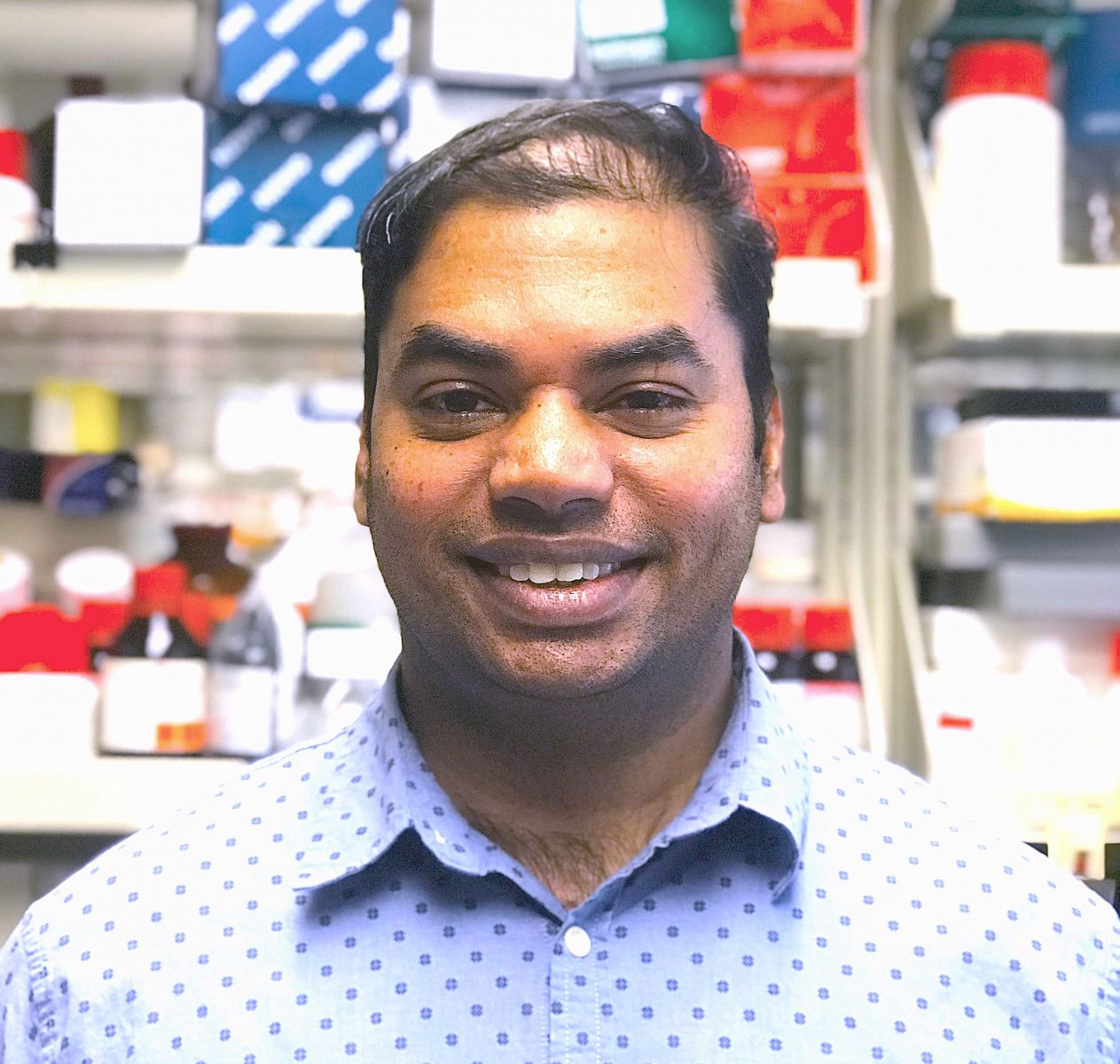
Talk: Mapping brain circuitry of stress using new single-cell genomic tools
When: 9am, Monday 4 September 2023, Symposium: Stress, New Frontiers (view programme)
Naresh Hanchate is a Principal Investigator in the Great Ormond Street Institute of Child Health at the University College London. Hanchate received his PhD in Neuroscience from the laboratory of Dr Vincent Prevot at the University of Lille. He then completed his postdoctoral training with Dr. Linda Buck at the Fred Hutchinson Cancer Centre (Seattle, USA), where he developed new single-cell genomic tools to study olfactory receptor transformations occurring during olfactory neurogenesis, and he later devised new single-cell strategies to molecularly map brain circuits.
He joined Institute of Child Health as a UCL Excellence Fellow, and recently, he received an MRC New Investigator award. At UCL, goal of the Hanchate lab is to illuminate the molecular and circuit mechanisms through which the brain controls physiology and behavior, particularly those involved in innate functions, such as stress, reproduction, & appetite, and how this circuitry plays a role in neurodevelopmental and neuropsychiatric disorders, primarily through single-cell genomics, neurogenetic tools, and systems neuroscience.
Allan Herbison

Talk: Recording the GnRH pulse and surge generators in vivo
When: 9am, Wednesday, 6 September 2023, Symposium: Reproductive Neuroendocrinology (view programme)
After graduating with an intercalated degree in neuroscience and medicine from the University of Otago, and time in clinical practice, Allan received a Commonwealth Scholarship to undertake a PhD in neuroendocrinology at the University of Cambridge. Allan then spent a further 12 years as Principal Investigator at The Babraham Institute and Fellow, Pembroke College, University of Cambridge before returning in 2002 to the Department of Physiology, University of Otago supported by the Wellcome Trust as Professor of Neuroendocrinology.
Allan has received multiple fellowships and prizes including the Lister-Jenner Fellowship of the Lister Institute UK, Mortyn Jones Prize of the British Society for Neuroendocrinology, Benoit Prize of the French Société de Neuroendocrinologie Expérimentale, Liley Medal from the NZ Health Research Council, Triennial Medal of the Physiological Society of NZ and the Distinguished Research Medal of the University of Otago.
Allan was elected Fellow of the Royal Society of New Zealand in 2007. Allan is currently a Professor of Neuroendocrinology and Wellcome Trust Senior Research Fellow at the University of Cambridge.
Jenni Harvey
%20x.jpg)
Talk: Food for thought: Exploring the cognitive enhancing and therapeutic potential of leptin
When: 4pm, Monday 4 September 2023, Symposium: Metabolism - Beyond the hypothalamus (view programme)
Jenni Harvey obtained a BSc Honours in Pharmacology at the University of Edinburgh (1990) before receiving a Ph.D. in 1993 for work on metabotropic glutamate receptors and synaptic transmission under the supervision of Prof Graham Collingridge (University of Birmingham). She then undertook postdoctoral research positions with Dr Mike Lacey (University of Birmingham) and Prof Mike Ashford (University of Aberdeen), before moving to Dundee to set up her own laboratory after being awarded a Wellcome Research Career Development Fellowship (2001). In 2005, she was awarded a Wellcome University Award to continue her studies into the role of leptin in hippocampal synaptic function. Jenni Harvey has remained in Dundee since, and a major focus of her current research is in determining the cellular and molecular processes underlying leptin’s effects in the brain and how dysfunctions in the leptin system impact brain function and specifically neurodegenerative disease.
Deyana Ivanova
Talk: The amygdala, a key upstream regulator of the hypothalamic GnRH pulse generator
When: 9am, Wednesday 6 September 2023, Symposium: Reproductive Neuroendocrinology (view programme)
Deyana Ivanova obtained her PhD in the department of Women and Children's Health at King’s College London, UK, in 2022 under the mentorship of Prof. Kevin O'Byrne. Her work focused on uncovering how psychological stress delays puberty, the long-term consequences into adulthood while interrogating the underlying neural mechanisms in female mice. She is currently a Postdoctoral Fellow at Harvard Medical School and Brigham and Women’s Hospital in Prof. Victor Navarro’s lab.
Sharon Ladyman
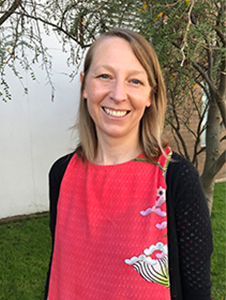
Talk: Neuroendocrine control of body temperature and physical activity during pregnancy
When: 2pm, Tuesday 5 September 2023, Symposium: MNeuroendocrine adaptations during pregnancy & development (view programme)
Dr Sharon Ladyman is a Senior Research Fellow in the Centre for Neuroendocrinology at the University of Otago, New Zealand. She completed her Ph.D. at the University of Otago then was a Postdoctoral Fellow at Oregon Health and Science University, Portland, and at Concordia University, Montreal, before returning to New Zealand. Her work focuses on understanding the neuro-hormonal circuits that regulate hyperphagia, glucose regulation, physical activity and thermoregulation during pregnancy and lactation. She is also interested in understanding how going through pregnancy and lactation influences long term metabolic health. Her favourite hormone is leptin, but her current research can’t seem to escape from the hormone prolactin.
Anna Murray

Talk: Decoding the Biological Clock: Exploring the Genetics of Human Reproductive Ageing
When: 5pm, Monday 4 September 2023, Public Lecture (view programme)
Anna is a Professor of Human Genetics at the University of Exeter. She completed her PhD in 1994 and did post-doctoral studies at the University of Southampton working on the genetics of Fragile X syndrome. A chance finding resulted in her specialising in the field of reproductive ageing, when she led a study that found an association between very early menopause and the gene that causes Fragile X. Anna moved to the University of Exeter in 2005 where she expanded her research programme to include multifactorial inheritance of reproductive ageing and associated traits. She has established an international reputation in reproductive genetics, co-leading the ReproGen consortium of around 40 studies worldwide.
Valerie Simonneaux
Talk: Neuroendocrine mechanisms of seasonal adaptation
When: 11am, Monday 4 September 2023, Mortyn Jones Lecture (view programme)
Valerie Simonneaux is a CNRS director of research, head of the team “Neuroendocrine rhythms in reproduction” at the Institute of Cellular and Integrative Neurosciences in Strasbourg, France. She has a broad background in the neuroendocrinology of biological rhythms. Her current focus is on the circadian and seasonal control of reproduction.
In the last few years her team has reported that hypothalamic neuropeptides of the RF-amide family (kisspeptin and RFRP-3) are pivotal relays between seasonal (melatonin, circannual clock) and daily (clock outputs) time cues and the central regulation of GnRH neurons. Her team is currently investigating how these neuroendocrine pathways are altered following circadian disruption or exposure to endocrine disruptors, and during long term regulation such as hibernation, circannual timing, maternal programming.
Besides this research activity, she is the director of the Strasbourg’s Interdisciplinary Institute of Neuroscience, she has been the president of the Society of NeuroEndocrinology and is now member of the council of the French Société des Neurosciences and the European Biological Rhythms Society.
Manuel Tena-Sempere

Talk: Exploring the neuroendocrine basis of puberty and reproduction: Kisspeptins and beyond
When: 11am, Tuesday 5 September 2023, Alison Douglas Lecture (view programme)
Manuel Tena-Sempere is a Professor of Physiology at the Turku Centure for Disease Modelling at the University of Turku.
Manuel's research group is interested in deciphering the neuroendocrine and molecular mechanisms responsible for the control of puberty and reproductive function, and how these finely interplay with the systems governing body weight and metabolic homeostasis. In this context, they are actively working in the characterization of the role of different neuropeptide systems in the neurohormonal regulation of puberty onset and fertility, with special attention to the analysis of the functions of kisspeptins and their interactions with other central (e.g., neurokinin B, other tachykinins, melanocortins, GnIH) and peripheral (e.g., leptin, sex steroids) regulators, as well as modulation by nutritional and metabolic cues. More recently, his group has become interested in disclosing the role of novel regulatory mechanisms, such as miRNAs, epigenetics and cellular energy sensors, in the joint control of metabolism and reproduction, and how these interplay with central neuropeptide networks (specially kisspeptins). This basic knowledge, generated mostly by the use of at-the-edge preclinical (rodent) models and techniques in neuroendocrine research has set the basis for implementation of translational projects, currently running in Manuel's group, targeting the metabolic and reproductive consequences of obesity-induced hypogonadism, as well as improved strategies for the diagnosis and treatment of common reproductive disorders, such as polycystic ovarian syndrome.
Eder Zavala

Talk: Quantitative analysis of high-resolution daily profiles of HPA axis hormones
When: 9am, Monday 4 September 2023, Symposium: Stress - New frontiers (view programme)
Eder Zavala is Assistant Professor at the centre for Systems Modelling & Quantitative Biomedicine (SMQB) at the University of Birmingham. As an applied mathematician, his work focuses on interrogating the dynamic regulation of stress hormones and their interaction with metabolism, fertility, sleep and inflammation. His goal is to develop a mathematical understanding of endocrine regulation that accounts for rhythmic hormone secretion, responses to perturbations, and long-term physio-pathological changes. Eder has held an MRC Skills Development Fellowship and a EU Horizon 2020 secondment to develop quantitative methods for the diagnosis and management of endocrine conditions. He has established international partnerships supported by the Global Challenges Research Fund, the Royal Society Newton Mobility Grant, the MRC, EPSRC, NIHR and intra-mural funding. His collaborations with clinicians, computer scientists and other mathematicians span several UK universities, as well as research institutions in the USA, Norway, Sweden, Greece, Korea, Mexico and Australia. Eder has also been appointed a member of the EPSRC Early Career Research forum for Mathematical Sciences (2022-2025).



